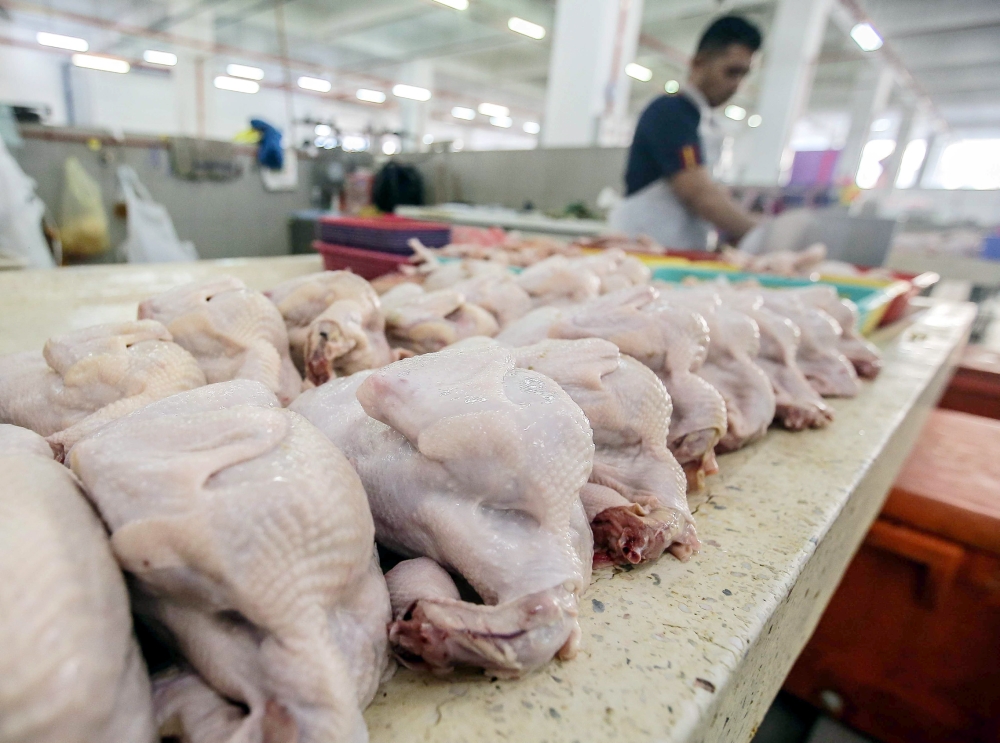KUALA LUMPUR, Feb 28 — The Malaysian government’s plan to remove controls on the selling price of chicken and eggs after June is a good idea that could even result in farmers being able to boost production due to reduced uncertainty for their farms, Sarawak Livestock Breeders’ Association (SLBA) said today.
SLBA, which has approximately 150 members, told Malay Mail that its members’ production of chicken and eggs has fulfilled the demand of local consumers in Sarawak.
“Sarawak has enough chicken to supply to our local market all this while,” the association replied when contacted by Malay Mail regarding the federal government’s plans.
In the response by SLBA’s head of broiler chicken section Sia Khiok Hui and head of egg section Bong Choon Sen, they addressed questions by Malay Mail on SLBA’s views on the government’s plan to float chicken and egg prices.
“Chicken and eggs are essential products like others. A floating price means the market selling price will be determined by demand and supply. This is a fair manner for businesses to justify the actual price by itself through market sentiment.
“We think that floating prices may help a lot not only for the present market to the farmer, but the improvement of the production of chicken and eggs in the future. It is a good thing to do,” they said.
Explaining the benefit of floating the selling prices for chicken and eggs, they said farmers would be able to have a direction for the future and manage the volume of their own production by knowing the actual market prices and cost.
In comparison, under the current system where the government has imposed price controls or maximum retail selling prices for chicken and egg, farmers will not be able to plan effectively, SLBA said.
Under the government’s price-controlled system, the costs for farmers to produce chicken and egg can often be higher than the price that their products are allowed to be sold at.
For example, in the Department of Statistics Malaysia’s (DOSM) December 30, 2022 report on a special study on production costs for chicken and egg in Malaysia, a Grade A egg had the controlled selling price of 43 sen for the months of January to June last year and 45 sen for the months of July to October last year.
The same DOSM report however showed that the production cost per Grade A egg last year for Malaysia as a whole was at 53 sen, but the actual production cost in each state varied. Aside from Melaka where it cost 40 sen to produce a Grade A egg, all other states had higher production costs than what the egg could be sold for, with costs ranging from 46 sen to 64 sen.
Currently, the maximum retail price for a Grade A egg in peninsular Malaysia is 45 sen, Sarawak (47 to 50 sen depending on district), Sabah (50 sen to 51 sen depending on district), and Labuan (51 sen).
While the government provides subsidies to the farmers to help make up for the differences while ensuring controlled low prices for consumers, such a system could actually discourage production as farmers try to cut down on their losses to ensure that their businesses remain viable.

“Farmers have been impacted by low chicken selling prices due to this government-controlled price and slow subsidy payout by the government. So, farmers cannot sustain the losses. With that, the best way to maintain sustainable businesses, farmers have no choice but to choose to reduce their production,” SLBA said.
Under a system where market conditions determine prices, SLBA agreed that it was possible for chicken and eggs to have cheaper prices if supply increases due to better capacity for farmers to plan ahead.
“But with the implementation of floating prices for chickens and eggs, farmers can see the outcome of the market demands and supply, so farmers can target their own future direction whether to increase or to reduce their production.
“With this confidence, the productivity of the farmers will definitely increase. When the supply is increased automatically the price of the chicken and eggs will become cheaper,” they said when explaining how such a scenario could work out.
On February 21, Agriculture and Food Security Minister Datuk Seri Mohamad Sabu announced the government’s plans to float chicken and egg prices in Malaysia after June and expressed confidence that it would further enhance supplies, even as he noted that the supply currently is sufficient.
Yesterday, Mohamad’s ministry said the Cabinet had agreed in a February 17 meeting for the government to continue paying for subsidies for chicken eggs until June 2023 with the total cost at RM1.28 billion, in order to ensure such supply remains stable. The ministry also expressed hope that a study on targeted subsidies would be finalised soon.
Following the tabling of Budget 2023 last Friday in Parliament, economist and think tank Socio-Economic Research Centre’s (SERC) executive director Lee Heng Guie had said subsidy rationalisation can be done by floating prices of items — such as petrol — and to then combine it with targeted financial aid to lower-income groups to partially offset the higher prices that may result after price controls are removed.





















